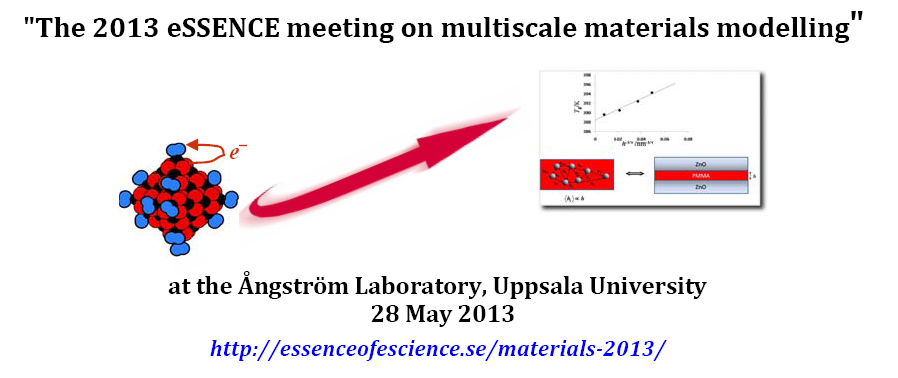To push the boundaries of e-science closer to realistic applications, and to improve our understanding of chemical and physical phenomena, development of methods and models at all levels is needed, from the electronic scale to coarse-grained simulations. Not least, we must find ways to combine methods in a powerful and creative fashion to bridge the different time and length gaps in a seamless fashion. The national e-science programme eSSENCE – where Uppsala University, Lund University and Umeå University are partners – now welcomes you to the meeting

At this meeting, we will use the word “materials” in a broad sense, i.e. also including molecules and molten materials (liquids). Colleagues from our national sister program SeRC, as well as other e-science actors or interested colleagues are welcome to participate. Senior researchers, postdocs and PhD students are all equally welcome.
Scientific contributions: Posters will be accompanied by short oral poster presentations – you are most welcome to sign up to present a poster! There will also be a few slots for contributed 15-minute oral presentations. Do this on 21 May at the latest! Registration Form
Registration: The meeting and the dinner and lunch will be free of charge to registered participants. Do this on 21 May at the latest! Registration Form
Program
ROOM: The Siegbahn Hall at the Ångström Laboratory (all day)
| 10.15 | Welcome and introduction (Kersti) | |
| 10.30-10.55 | Talk: Aatto Laaksonen (SU) | |
| 11.00-11.25 | Talk: Peter Broqvist (UU) | |
| 11.30-11.55 | Talk: Biplab Sanyal (UU) | |
| 12.00-13.30 |
The scientific case – intro- KH “How big are our future computer/storage needs – and why?” Vetenskapsrådet is currently investigating this – and it may affect our future! Think about good arguments! The report shall be ready in August. Sandwich lunch. Discussion about the VR-survey. |
|
| 13.30-14.15 | Keynote talk: Michael Probst (Innsbruck University)
“Ab initio MD vs force-field based MD − and Classical MD vs. quantum-based simulations − is there a winner ?” |
|
| 14.20-14.45 | Talk: Magnus Ullner (LU) | |
| 14.50-15.15 | Talk: Mårten Ahlquist (KTH) | |
| 15.20-15.35 | Oral poster presentations | |
| 15.35-16.10 |
Coffee and posters |
|
| 16.10-16.35 | Talk: Andreas Larsson (LTU) | |
| 16.40-17.05 | Talk: Lars Pettersson (SU) | |
| 17.10-17.35 | Talk: Sten Sarman (SU) | |
| 17.45-18.00 | About eSSENCE: Ingela Nyström (UU) | |
| ca. 18.15 |
Mingel and dinner at Ångström |
Keynote speaker: Michael Probst (Innsbruck University): ” Ab initio vs. force-field based Molecular Dynamics − and Classical vs. quantum-based simulations − is there a winner?”
Invited and contributed talks:
Aatto Laaksonen (SU): “In silico studies of ionic liquids”
Peter Broqvist (UU): “Multiscale modelling development for oxide nanoparticles – an ongoing struggle”
Biplab Sanyal (UU): “Possibilities and challenges of graphene calculations”
Magnus Ullner (LU): “Coarse-grained Monte Carlo Simulations of Polyelectrolyte Solutions”
Mårten Ahlquist (KTH) “Hydrogen generation and activation by first row transition metals”
Andreas Larsson (LTU) “Dispersion-corrected DFT improves metal-molecule description”
Lars G M Pettersson (SU): “Stability of Pt-modified Cu(111) in the presence of oxygen”
Sten Sarman (SU): “Study of transport processes and transport coefficients by nonequilibrium molecular dynamics simulation”
Oral poster presentations
* Hans Ågren
* Matti Hellström
* Shuanglin Hu
* Jolla Kullgren
Materials Modelling 2013 – additional information
Kersti Hermansson
kersti@kemi.uu.se
Tel 018-4713767